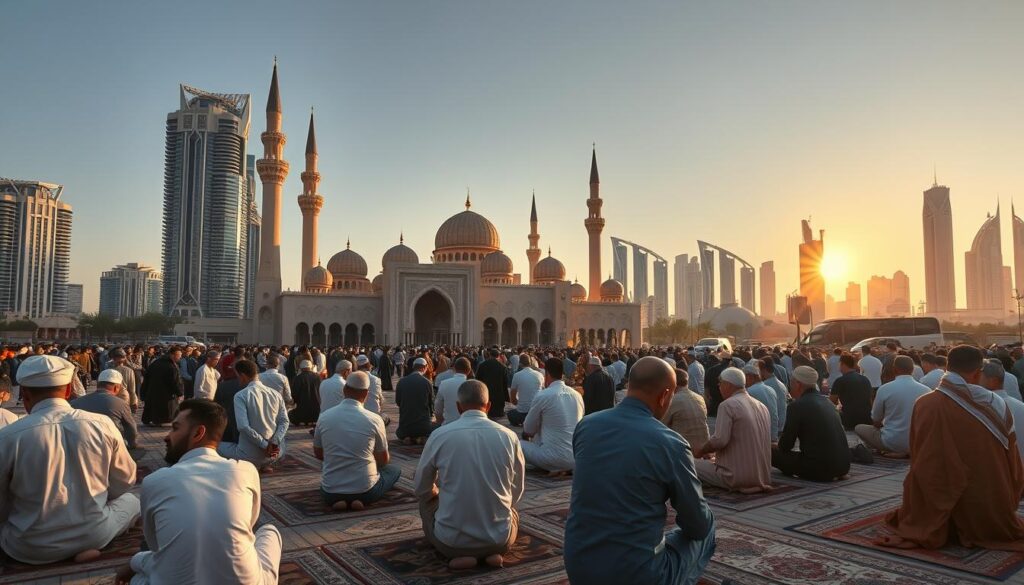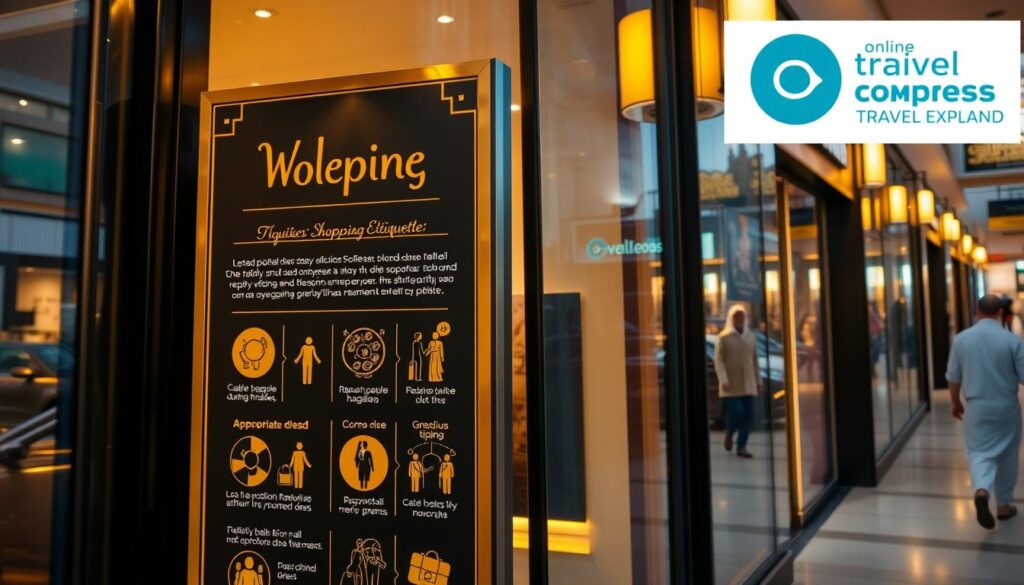Did you know over 15 million tourists visit Dubai every year? Many of them accidentally break local rules. It’s key to know Dubai’s cultural norms for a fun and respectful trip.
Exploring Dubai is more than just following a guidebook. You need to be culturally aware. The city mixes old Islamic values with a modern lifestyle. Tourists must be careful in this unique setting.
Dubai’s etiquette covers dress codes and how to interact with people. Whether you’re in fancy malls or old souks, knowing UAE tourist etiquette tips makes your trip better.
Learning Dubai’s dos and don’ts is not just to avoid awkward moments. It’s about showing respect and making connections with the locals.
Key Takeaways
- Respect local customs and dress codes
- Learn basic Arabic greetings
- Be mindful of public behavior
- Understand religious sensitivities
- Embrace cultural differences with openness
Understanding Dubai’s Cultural Background
Dubai is a mix of old traditions and new global trends. It’s a city where heritage and innovation meet. This blend makes Dubai special.
The city’s culture is shaped by ancient traditions and modern tech. Knowing these norms is key for those wanting real Dubai experiences.
The Blend of Tradition and Modernity
Dubai balances old Bedouin ways and new city life. This mix is what makes Dubai unique. Here, ancient and modern live side by side.
- Ancient pearl diving meets modern skyscrapers
- Arabic hospitality meets global business
- Islamic values and modern lifestyle choices
Importance of Respect in Emirati Culture
Respect is at the heart of UAE culture. Emiratis value dignity, social order, and keeping traditions alive. Showing respect for local customs will earn you a warm welcome.
| Cultural Value | Practical Manifestation |
|---|---|
| Hospitality | Welcoming guests with traditional Arabic coffee and dates |
| Family Bonds | Strong emphasis on extended family connections and mutual support |
| Religious Respect | Observing prayer times and modest dress codes |
By being respectful and curious, you’ll connect with Dubai on a deeper level. This will make your visit more rewarding.
Dress Code: What You Should Wear
Dubai’s dress code is all about cultural sensitivity. It’s important to wear clothes that show respect for local traditions. Your outfit can greatly affect your time in Dubai and how locals treat you.
![]()
Dubai mixes modern style with traditional Islamic norms. It’s key to be aware of your clothes in different places. Knowing what to wear makes your trip better and more enjoyable.
Modesty is Key
Here are some must-know dress tips for Dubai:
- Cover shoulders and knees in public
- Avoid tight or revealing clothes
- Choose loose, breathable fabrics
- Carry a scarf or shawl for extra coverage
Appropriate Attire for Different Venues
Dress codes vary in Dubai’s different spots:
- Mosques: Wear full body coverage, including headscarves
- Beaches: Swimwear is okay here
- Luxury Restaurants: Go for smart casual to formal
- Shopping Malls: Dress conservatively and respectfully
“Dress with respect, and Dubai will welcome you warmly.”
Respecting local dress customs shows you care about the culture. It leads to better interactions with the Emirati community.
Greeting Etiquette: How to Say Hello
Understanding social interactions in Dubai is key. Greetings show respect and follow cultural traditions.
In the UAE, you’ll see both traditional and modern greetings. Respect, warmth, and cultural sensitivity are important.
Handshake Protocols
Greeting customs in Dubai can be tricky for tourists. Here are some tips:
- Between men, handshakes are common and expected
- Wait for a woman to extend her hand first
- Some conservative Muslims may prefer not to shake hands with the opposite gender
“Respect is the foundation of every meaningful interaction in Dubai.” – Local Cultural Expert
Social Hierarchy in Greetings
Knowing Dubai’s social dynamics is important. Respect for elders and authority figures is paramount. When greeting someone:
- Address older or more senior individuals first
- Use formal titles when possible
- Learn basic Arabic greeting phrases like As-salaam-alaikum (peace be upon you)
Being aware of these cultural details will help you interact with respect and grace.
Dining Etiquette in Dubai
Dining in Dubai is a unique experience. You’ll find a mix of traditional Emirati ways and global tastes. From street food to fine dining restaurants with stunning views, there’s something for everyone.
Knowing Dubai’s dining customs is important. It shows respect and makes your meals more enjoyable.
Best Practices When Eating Out
Following UAE tourist etiquette tips can enhance your dining. Here are key things to remember:
- Use your right hand for eating and handling food
- Wait for the host to start eating before you do
- Accept food and drink to show respect
- Dress modestly in restaurants
![]()
Tipping: Is It Mandatory?
Tipping in Dubai is not required but is appreciated. It shows gratitude in many places.
| Dining Establishment | Recommended Tip |
|---|---|
| Restaurants | 10-15% of total bill |
| Cafes | 5-10% |
| Hotel Room Service | 10% |
Pro tip: Always check your bill for service charges. If unsure, ask your server about tipping.
Respecting local dining customs makes your meals more enjoyable. It also shows respect for Dubai’s culture.
Photography Etiquette: Do’s and Don’ts
Capturing memories in Dubai needs cultural sensitivity. Knowing how to behave as a tourist is key for photography. The city’s rich culture asks for a respectful way to take pictures.
Photography etiquette in Dubai is complex. Tourists must respect local customs and laws when documenting their trips.
Asking for Permission: A Crucial Step
Photographing people in Dubai has strict rules. Always ask for permission before taking someone’s picture, especially:
- Local women and children
- Religious figures
- Government workers
- Traditional dress wearers
Avoiding Sensitive Locations
Some places are off-limits for photos. Tourists should know where they can’t take pictures:
- Government buildings
- Military installations
- Religious sites
- Infrastructure facilities
“Respect is the universal language that transcends all cultural boundaries.” – Dubai Tourism Board
For responsible photography, carry a translation card in Arabic. Use polite gestures and be ready to delete photos if asked.
Pro tip: When in doubt, always ask first and respect local wishes.
Respecting Religious Practices
Dubai’s culture is deeply rooted in Islamic traditions. It’s important for tourists to understand and respect these practices. Your cultural sensitivity can make your trip more meaningful and help you connect with local customs.

In the UAE, it’s key to follow religious norms, especially in sacred spaces and cultural events. Visitors should show genuine curiosity and respect when exploring religious practices.
Dress Code in Mosques
When visiting mosques, it’s important to dress modestly and appropriately. Here are some essential tips:
- Wear loose-fitting, long clothing that covers shoulders and knees
- Women should carry a headscarf to cover their hair
- Remove shoes before entering prayer areas
- Avoid tight or revealing clothing
Ramadan Considerations for Tourists
During Ramadan, tourists need to be extra mindful of local customs. Following local practices during this time shows respect and cultural awareness.
- Refrain from eating, drinking, or smoking in public during daylight hours
- Dress more conservatively than usual
- Expect reduced restaurant and business operating hours
- Be prepared for changed social dynamics
Remember, your respectful behavior can create meaningful cross-cultural connections and enhance your travel experience in Dubai.
Public Behavior: What is Acceptable?
Dubai’s public spaces have their own rules. It’s important to know these to avoid trouble. Being respectful and considerate is key, whether you live here or are just visiting.
Dubai’s culture is all about respect and dignity. As a guest, you need to follow certain rules. These rules are different from what you might be used to in the West.
Avoiding Public Displays of Affection
In Dubai, showing love in public is a big no-no. Here’s what you should know:
- Kissing, hugging, or holding hands in public is seen as wrong
- Getting too close can get you in trouble with the law
- It’s best to keep things to yourself in public places
Noise Levels and Personal Space
People in Dubai like it quiet. Here’s how to act in public:
- Speak softly and avoid loud talking
- Don’t get too close to others
- Try not to laugh too loudly or cause a scene
Being aware of local customs is crucial for a good time in Dubai.
Shopping Etiquette in Dubai
Exploring Dubai’s shopping scene means knowing local customs. Whether you’re in traditional souks or modern malls, the right etiquette makes a big difference. It can turn your shopping trip in the UAE into a memorable one.

Dubai’s shopping scene is unique. It mixes traditional markets with top-notch malls. As a tourist, showing respect and cultural awareness is key.
Bargaining in Traditional Souks
Bargaining is a skill in Dubai’s traditional markets. Here are some tips for successful haggling:
- Always be polite and friendly during negotiations
- Start at 40-50% of the initial asking price
- Be prepared to walk away if the price doesn’t meet your expectations
- Smile and maintain a relaxed demeanor
Respecting Local Shopping Customs
To have a great shopping experience, remember these UAE travel etiquette tips:
- Dress modestly, especially in traditional markets
- Ask permission before photographing merchandise or vendors
- Avoid aggressive bargaining or confrontational behavior
- Carry cash for souk transactions
Understanding and respecting local customs makes your shopping in Dubai better. It also helps you have positive interactions with local merchants.
Understanding Laws and Regulations
Dubai’s legal scene is complex. Knowing Dubai’s cultural rules is key for a great visit. Being aware of local laws helps avoid trouble.
Dubai has strict laws, unlike many Western countries. To act right in Dubai, you must respect the culture and laws.
Critical Legal Considerations for Visitors
Every tourist should know these important legal points:
- Alcohol rules are strict and need careful following
- Public behavior must be conservative and respectful
- Some areas have photo restrictions
- Social media use is watched and has rules
Common Mistakes to Avoid
Many tourists accidentally break Dubai’s laws. Being aware is your best defense against legal problems. Here are some big mistakes to avoid:
- Showing too much affection in public
- Wearing the wrong clothes in sacred or cultural places
- Photographing people without asking
- Drinking alcohol where it’s not allowed
Respect local customs and laws – your journey will be much more enjoyable!
Knowing and following Dubai’s laws makes your visit better. Always check local rules before you go and watch for cultural signs.
Learning Basic Arabic Phrases
Learning a few basic Arabic phrases can greatly improve your UAE travel etiquette. Arabic is more than a language; it’s a way to connect deeply with the culture. Simple greetings can change how you interact and show respect for local customs.
In Dubai, knowing key phrases can make a big difference. Start with “Marhaba” (hello), “Shukran” (thank you), and “Min fadlak” (please). These phrases help you connect with locals and show you care about their culture. People appreciate when visitors try to speak their language, even a little.
Essential Phrases for Travelers
Communicating in Arabic in Dubai is best done with confidence and humility. While many people speak English, using Arabic can make a big impact. Don’t worry if it’s hard at first; locals will be happy you’re trying. Try practicing phrases like “As-salaam-alaikum” (peace be upon you) and “Na’am” (yes) before you go.
Remember, the right choice between Arabic and English depends on the situation. In work settings, English is common. But in personal talks, market deals, and casual chats, Arabic is a great choice. Showing you’re willing to learn Arabic shows you respect and care about the culture.
Language Tips for Cultural Immersion
Keep your pronunciation simple and real. Watch videos to get your accent right. Carry a phrasebook or use apps to help you learn. Your hard work will make your trip more meaningful and your interactions with locals unforgettable.

